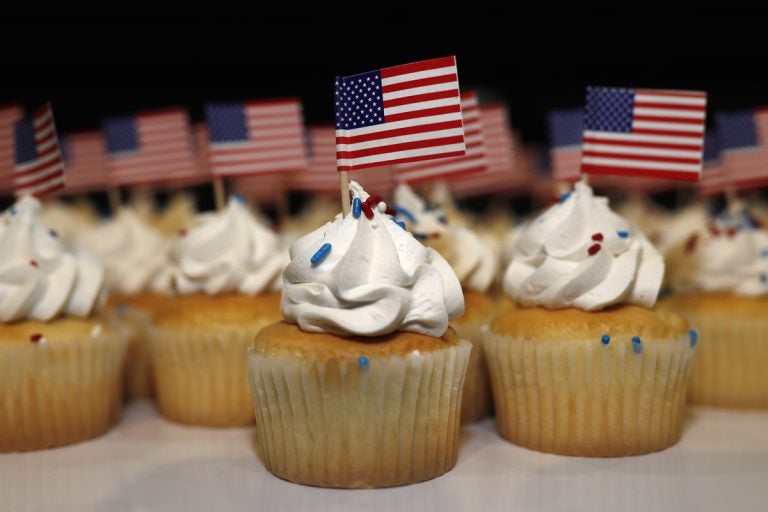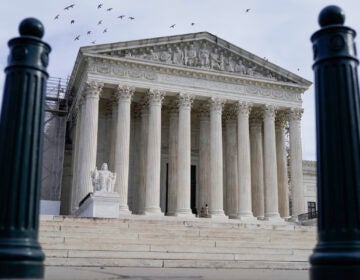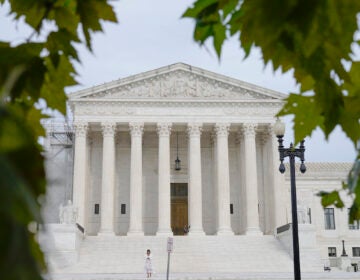Discrimination tastes terrible, even with icing
If SCOTUS decides to take society backward by siding with Masterpiece Cakeshop, we will immediately see a rush of attacks on existing LGBT protections.

Cupcakes sit on trays at a rally in Lakewood, Colo., for Jack Phillips, a baker at the center of a case being considered by the U.S. Supreme Court that may determine if business owners' rights of religious liberty and free expression are violated by having to offer wedding services to same-sex couples. (AP Photo/David Zalubowski)
Regardless of your personal bias or beliefs against the LGBT community, selling your products to anyone and everyone who would want to buy them is simply good business sense. But beyond being fiscally foolish, not doing so because you disagree with someone goes against the fundamental social contract we have with one another as Americans. Taxpayers pay for all our roads, schools, first responders, and everything else we share as we go about our daily lives. And those taxpayers expect to receive equal and unfettered access to those services regardless of who they are, or what they believe.
So the justification behind the Masterpiece Cakeshop case at the U.S. Supreme Court — which could allow business owners who harbor anti-LGBT convictions to do so while operating a business that utilizes our publicly funded infrastructure — tears up that social contract while enshrining both bigotry and bad business.
Our states are still a patchwork of inequality because of inconsistent nondiscrimination protections and an absence of a comprehensive federal non-discrimination law. For example, gays and lesbians can now marry in all 50 states, but putting their spouse’s photo on their desk can get them fired without any legal recourse in more than 25 states; several more states make it even more precarious for transgender people in the workplace. Despite major advancements in corporate culture and societal inclusion, fear of discrimination keeps LGBT workers, and our economy, from achieving full potential.
Now we face the very real possibility of adding even greater fear and harm to the LGBT community with the prospect of being kicked out of stores, restaurants, hotels, and perhaps even our homes simply because of the proprietor’s beliefs. If SCOTUS decides to take society backward by siding with the cakeshop and its supporters, we will immediately see a rush of attacks on existing LGBT protections and recent progress.
Those who would willingly turn away LGBT people from their places of business are allowing ideology to blind them to a fundamental economic truth: diversity and inclusion are good for business. Just two decades ago, slapping a rainbow on a liquor bottle one month a year was enough for a brand to consider itself “gay-friendly.”
Thankfully, the power of LGBT brand loyalty has moved many of the businesses we all know and love to far more authentically represent the LGBT community in its marketing and advertising. And for good reason: More than 75 percent of LGBT adults and their friends, family, and relatives would switch to brands that are known to be LGBT-friendly. In 2017 alone, the LGBT consumer buying power was over $917 billion dollars, a spending power that rivals the disposable income of other American minority groups. Couple that with the $1.7 trillion that LGBT business owners and job creators add to the GDP every year, and the LGBT community is quite the force with which to reckon.
America’s largest corporations, sports leagues, and organizational conferences have committed themselves to doing business in cities and states with non-discrimination policies on the books. Should the Masterpiece Cakeshop case permit local businesses to discriminate against LGBT consumers, these pro-inclusion companies could see a dramatic rise in LGBT purchasing. Whereas anti-LGBT companies, like Masterpiece Cakeshop, will soon learn that consumers prefer the sweet taste of inclusion over the stench of discrimination.
There will also be major economic damage in localities that don’t stand up and say that discrimination on Main Street is wrong. The more than $3 billion lost by the state of North Carolina while it promoted its anti-transgender “bathroom bill” will be a drop in the bucket against the total tax revenue, industry growth, and innovation lost in places that would now allow the marginalization and exclusion of fellow Americans. Local economies succeed only when there is a fully engaged and protected workforce and supply chain, free from fear and discrimination.
But perhaps most frightening among the implications in this case is that we could be facing an assault on all American minorities under the façade of “religious liberty.” In recent months we have seen unprecedented co-operation and solidarity between our nation’s diverse communities. Too often conversations about LGBT rights ignore the essential fact that we include women, communities of color, people with disabilities, immigrants, veterans, and so many others who could be further marginalized if this case ushers in a new era of exclusion. If sanctioned by the Court, it could soon be perfectly legal for businesses with religious objections to make second-class citizens out of any community, religion, or nationality with which its management may disagree.
That social contract that binds our tax dollars together for the collective good of our society also binds our society together for the collective good of our economy. We may not ever fully agree with one another, but we must respect that keeping businesses open for all is at the very heart of who we are as Americans. The City of Philadelphia currently offers its LGBT citizens several essential protections from this kind of public discrimination, but even those in the City of Brotherly Love and Sisterly Affection face uncertain times ahead should the court endorse the cakemakers’ recipe for discrimination to be fully baked into law.
—
Jonathan Lovitz is senior vice president of NGLCC, the National LGBT Chamber of Commerce.
WHYY is your source for fact-based, in-depth journalism and information. As a nonprofit organization, we rely on financial support from readers like you. Please give today.




